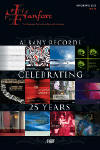Texte paru dans: / Appeared in:

Fanfare Magazine: 36:4 (03-04/2013)
Pour
s'abonner / Subscription information
Les abonnés à Fanfare Magazine ont accès aux archives du
magazine sur internet.
Subscribers to Fanfare Magazine have access to the archives of the magazine
on the net.
Code-barres / Barcode : 0093046755560 (ID288)
Passion as it is meant in this context is not a modern term, but appropriate for the album’s title even considering its musical vintage: the 14th century English translation of the Bible, attributed to John Wycliffe, uses the word. Along with the Resurrection, it has formed a central theme of some of the most striking and beautiful music of the 16th century. Most of it is reasonably well recorded, such as Byrd’s In Resurrectione tua , Crequillon’s Congratulamini mihi , and Cornysh’s Woefully Arrayed . There is one striking exception: John McCabe’s Woefully Arrayed , written specifically for Stile Antico. I’ve previously enjoyed several of McCabe’s compositions, but find this one counterintuitive in its handling of textual rhythms, and uninspired in its minimalist avoidance of expressive gestures. That aside, familiarity doesn’t lessen the enjoyment derived from a uniformly excellent series of musical choices on a single CD, and especially not when sung like this.
At the time I reviewed Stile Antico’s last release ( Tume Thy Musicke to Thy Hart: Tudor & Jacobean music for private devotion ; Harmonia Mundi 807554), they were a leaderless SATB ensemble of 12 young singers. An official from Harmonia Mundi heard them at a choral competition, and offered them a contract on the spot. Here they’ve expanded to 15 for some selections, though the core group of 12 remains. In that review I praised them for a “range of colors that didn’t strive regularly for a uniform timbral blend,” as some other British choirs prefer. It holds true for this album, too. The successive entries that dramatically shift colors in Tallis’s O sacrum convivium , and the play of the isolated top line in Lheritier’s Surrexit pastor bonus against the distinctive, interacting lower ones, shouldn’t be taken as implying the ensemble lacks the ability to blend their sound as required. They remain flexible according to their perceived understanding of the musical thought developed through each work. The intimacy and varied intensity of Victoria’s O vos omnes find their expression through tight, closely balanced harmonies, and variations in volume; Gibbons’s deservedly popular Hosanna to the Son of David strives for, and achieves, an evenness of tone across all voices, and a clarity that makes its counterpoint a joy to hear. It helps that the venue of the recording is resonant without overwhelming the edge of the voices, or the enunciation of the text. Miking is close, so none of the quality of the singing is missed. Strongly recommended, then. This is a disc to treasure, both for its time of the year, and for no specific occasion at all.
Cliquez l'un ou l'autre
bouton pour découvrir bien d'autres critiques de CD
Click either button for many other reviews



